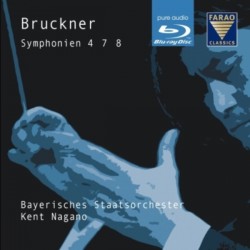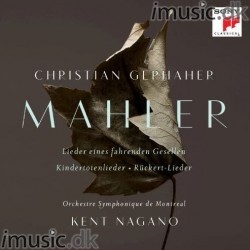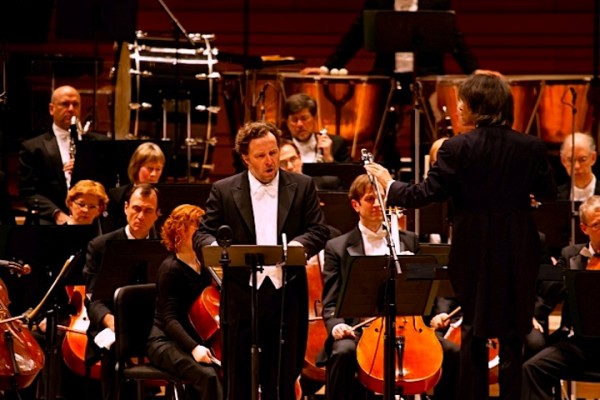Classical CD Reviews: Kent Nagano/ Bruckner Symphonies and Christian Gerhaher/ Mahler’s Orchestral Lieder
Christian Gerhaher is, perhaps, the great Mahler baritone of his generation, while Bruckner is, perhaps, a surprising choice for conductor Kent Nagano, whose championship of new music is legendary.
By Jonathan Blumhofer
Kent Nagano’s been a pretty busy man of late. Music director of the Orchestre symphonique de Montréal since 2006, he’s taking up the position of principal guest conductor of the Gothenburg Symphony this fall. In addition, he assumes the post of music director of the Hamburg Opera in 2015. The current season marks his last as general music director of the Munich State Opera, and, to commemorate his seven-year tenure, Farao Classics has released a partial cycle of the symphonies of Anton Bruckner – nos. 4, 7, and 8 – with Nagano leading the Bayerisches Staatsorchester (BSO).
Bruckner is, perhaps, a surprising choice for Nagano, whose championship of new music is legendary. But Bruckner’s symphonies have a visionary quality that connects them in surprising ways to contemporary music – both John Adams and Ingram Marshall have spoken of their admiration of Bruckner – and Nagano often taps into that strain in this set. Additionally, Nagano helped himself by opting for Bruckner’s original versions of the Fourth and Eighth Symphonies, rather than their more familiar revisions. Herbert Blomstedt did the same for some of the installments in his complete Bruckner cycle (out last year on Querstand – see my Arts Fuse review) and the results here are similarly revealing: it seems that the time is ripe to finally discover Bruckner the Progressive, as he’s termed in the liner notes.
The 1874 version of the Fourth gets, on the whole, an electrifying workout. The finale packs a real punch, well paced and never sluggish with thrilling, clarion brass triumphing at the end, while the middle movements (including a wholly different Scherzo from the familiar later versions) alternate passionate lyricism and rustic energy. By contrast, the first movement feels a little off – Nagano draws playing from the BSO that’s light-textured, but too much so: it’s an interpretation that needs more weight. Still, this is an account that ultimately delivers the goods.
The original version of the Eighth, too, is a wonder. There are some very obvious differences between this edition and subsequent revisions (a blazing coda to the first movement among them) and, though this version is considerably longer than the others, it’s wholly compelling. Nagano opts for tempos that are on the spacious side, but with the creamy, burnished tone he draws from the BSO, who cares? It’s an approach that well suits this symphony’s epic size, and the playing rarely feels slow: Nagano maintains the music’s intensity and interest across its almost-100 minute duration, and that’s quite an accomplishment.
Nagano draws weighty readings of the first two movements, the opening one so majestic and tragic that the loud, lengthy C major coda at the end feels tacked on (omitting it from subsequent versions was perhaps one of Bruckner’s better second thoughts). The big Adagio gets a sensitive, mystical reading, one that recalls Carlo Maria Giulini’s remarkable account on Deutsche Grammophon with its sense of pacing and otherworldliness. In the finale, too, the sense of nobility and inexorable unfolding is ever present: few recordings capture the music’s struggle and triumph with greater clarity or conviction.
Unfortunately, Nagano doesn’t seem to have much to say about the Seventh Symphony and he delivers a frustratingly timid account that blows neither hot nor cold. A safe middle ground might work in some repertoire, but not here, especially when there are so many great recordings of this piece to begin with.
Yes, the BSO sounds wonderful throughout – every note is in place – but the spark present in the other two recordings (both made in the studio) is oddly absent from this live performance. There are a couple of bright spots (including a brilliant coda to the first movement) but this interpretation’s electrifying moments are conspicuous by their lonesomeness. The big slow movement, a memorial to Wagner, lacks any sense of funereal grandeur – it sounds more like a bucolic stroll through the Styrian countryside than anything else – and, though the last two movements pick up steam, they’re too slight to redeem the evisceration of the Symphony’s heart that takes place over its first half. This Seventh is the surprising miss in an otherwise strong set.
In addition to the set of the three symphonies being released together, Farao is also releasing the Eighth as a stand-alone double-disc set.
*****
It’s hard to imagine a composer whose fortunes have shifted more dramatically in the last century than Gustav Mahler. Though he was never as neglected as some of his more passionate advocates would have you believe, he was certainly known more by reputation than by music to most concertgoers in the years before World War 2. The so-called “Mahler Boom” in the 1960s unleashed tremendous interest in his music and led to a thorough documentation of his music on record, beginning with Leonard Bernstein’s landmark cycle of the nine symphonies on CBS. And this enthusiasm has continued, more or less unabated, for the last fifty-plus years: if anything, there’s an oversaturation of Mahler on the market these days.
So it’s especially nice when a new disc comes along to remind you just what all the fuss was once about. Such is the case with Christian Gerhaher’s new recording (from Sony Classical) of Mahler’s three orchestral song cycles – Lieder eines fahrenden Gesellen, Kindertotenlieder, and the Rückert Lieder – with Kent Nagano and one of his other orchestras, the Orchestre symphonique de Montréal (OSM).
Gerhaher is, perhaps, the great Mahler baritone of his generation. He certainly sounds like it here. His voice is rich and powerful, but it’s capable of remarkably delicate nuance and shadings of color – listen to the album’s final track, “Ich bin der Welt abhanden gekommen,” for one of the most staggeringly beautiful examples of blending vocal and instrumental tone color.
And he lives this music deeply, whether as the weary, ill-fated wanderer of the Gesellenlieder, the desolated parent in the Kindertotenlieder, or the Romantic in the Rückert Lieder. Indeed, this disc contains a striking account of the Kindertotenlieder. Mahler is on record as stating his preference for a male voice to sing these songs and, though there are plenty of fine accounts by female singers, there’s something particularly haunting about a baritone taking on these grim laments. Gerhaher gets to the heart of these bitter texts, assuming the role of a stunned, grieving parent with uncanny sensitivity. And Nagano draws playing from the OSM that brilliantly matches in color and tone: the final song, “In diesem Wetter,” unfolds with a striking inevitability – you can almost feel the tension and guilt melting into acceptance and resignation over the closing bars.
The Gesellen- and Rückert Lieder similarly demonstrate a remarkable connection between soloist, conductor, and orchestra.
There are a few instrumental imbalances throughout the disc – wind instruments sometimes getting covered by brass and so forth – and there is some background noise (the recording comes from live performances in Montreal), but these are small blemishes. This album documents what must have been some powerful concerts and, what’s more, it conveys that on repeated listening: this is a must-have for Mahler-philes and lovers of great vocal/orchestral pairings, generally.
Jonathan Blumhofer is a composer and violist who has been active in the greater Boston area since 2004. His music has received numerous awards and been performed by various ensembles, including the American Composers Orchestra, Kiev Philharmonic, Camerata Chicago, Xanthos Ensemble, and Juventas New Music Group. Since receiving his doctorate from Boston University in 2010, Jon has taught at Clark University, Worcester Polytechnic Institute, and online for the University of Phoenix, in addition to writing music criticism for the Worcester Telegram & Gazette.



